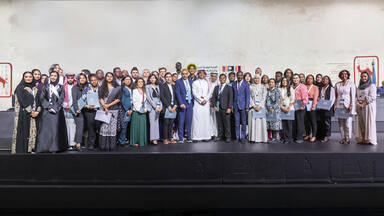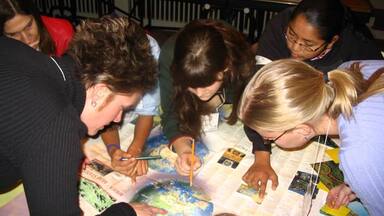World Heritage Youth Forum (1995)
Our Pledge, Bergen, Norway
Cultural and natural sites form the environment on which human beings are dependent psychologically, religiously, educationally and economically. Their destruction or even deterioration could be harmful to the survival of our identity, our nations and our planet. We have the responsibility to preserve these sites for future generations.
Our active participation in preserving the world heritage has so far included various actions, such as
- Cleaning the sites (Cuba);
- Restoration and reconstruction of old buildings and other heritage sites, including revival of traditional crafts (Hungary);
- Written information about heritage sites, as for instance through a journal made by school children (Senegal);
- Children's books on historical themes where monuments and sites are included as illustrations (Zimbabwe);
- Improving personal knowledge through computer networks and CD-ROM interactive media (Norway)
- Taking into consideration the fragility of this heritage, we must develop a responsible awareness towards conserving it, but in order to accomplish this, we need help.
Our Expectations
We ask for help from UNESCO and other international bodies, from governments, from local authorities and even from private sponsors.
Our proposals for action
Education
Education in favor of cultural and natural heritage, so that we can understand the World Heritage Convention, should be incorporated in national curricula. This should include visits to sites as well as regular teaching hours in the subject matter.
We need interesting and relevant education material to help us understand the importance of World Heritage. Young people should participate in its preparation.
We need a long-term Plan of action for World Heritage education to encourage and monitor work undertaken by young people, teachers, national authorities and international organizations. This should include practical guidelines for youth involvement in the preservation of heritage.
Voluntary work
The organization of voluntary clubs, workshops etc. in our communities are helpful to create a wider interest and involvement of youth.
Role of UNESCO
We ask UNESCO to continue World Heritage projects through periodic national, regional and international gatherings (as this Forum) and the Associated Schools Project, and to provide educational material, information networks and technical equipment.
We ask for UNESCO to revive forgotten cultures because ignoring culture does not mean preserving it.
Mass media
The role of mass media is very important. Famous celebrities, young people's idols, should be invited to help support the World Heritage cause so as to mobilize all young people.
Tourism
Tourism has both positive and negative effects on heritage sites and there is need to ensure the former and eliminate the latter, and young people can contribute to a new form of "cultural tourism".
Youth committees
Local and national authorities, such as mayors, should help establish youth advisory committees (councils) on protection of cultural and natural heritage.
Consequently, we, the young people from various parts of the world, conscious of the international importance of these sites, commit ourselves to participate in the safeguarding of this heritage and to fight against its destruction.
In order to meet our expectations, we the young people, the students from 30 countries throughout the world attending the First UNESCO World Heritage Forum being held in Bergen, Norway, on 27 June 1995 are committed to do the maximum. We want to co-operate with you the adults, mayors and decision-makers who have experience and wisdom to share with us.
Summary Report
The idea for the Forum originated at UNESCO's World Heritage Centre following the first General Assembly of the Organization of World Heritage Cities (OWHC) held in Fez, Morocco, in September 1993.
This first Youth Forum was a pilot project and its objectives were:
- To sensitize young people to the importance of the World Heritage Convention and the Cultural and Natural sites in their respective countries and elsewhere, which are being protected and promoted under the World Heritage Convention;
- To initiate and/or reinforce teaching about the World Heritage Convention and the listed cultural/natural sites and to help produce relevant educational materials adapted to different socio-cultural environments;
- To develop innovative interdisciplinary/ pluridisciplinary educational approaches, including extra-curricular activities (e.g. field visits to sites, conduct information campaigns in the community, etc.);
- To encourage the preservation of traditional skills (artisanat - hand crafts) needed for the restoration and maintenance of cultural World Heritage sites by awakening the interest for these among children and young people;
- To ensure cooperation between participating countries including eight bilateral twinning arrangements in order to exchange information on educational approaches which are being developed and the corresponding teaching/learning material;
- To provide concrete possibilities by which to reinforce young people's sense of responsibility to their cultural/natural heritage and to encourage them to participate actively in their societies' democratic decision making process;
- To promote a dialogue on the importance of cultural and natural heritage between young people as future tax payers and decision makers at both the local/national and the international levels;
- To contribute to UNESCO's efforts in preserving the World heritage cultural and natural properties by helping the young people discover the ethical and civilizational messages embodied in these sites thereby encouraging respect of other cultures, particularly in view of the 1995 International Year of Tolerance and the 50th Anniversary of the UN and UNESCO (1995-1996).
Highlights
The young people did not come empty-handed but brought with them models of their country's natural or cultural sites to put on display. The models were entered for a competition and the winners were honored by seeing photographs of their work reproduced in the 1996 UNESCO Associated Schools calendar. Guided by young Norwegians and their teachers, those taking part in the forum made contact with the people of the host country and visited the historical site of Bergen and its environs, thus putting into practice one of the basic principles that united them, i.e. to teach one another, and enriching their knowledge of cultures and lifestyles different from their own. These moments of relaxation alternated with sessions of intense thought and discussion.
One of the highlights of the forum for all was meeting the mayors of Quebec, Cuzco, Kathmandu, Djenné, Tunis and Budapest. The discussion on such subjects as how to move the young to action on the heritage, what place to give them in city centres and how to ensure their voice is heard by the decision-makers was impassioned, and raised passions bringing out the inadequacy of what was being done to give young people responsibilities and the importance of the educational dimension. Preservation of the natural and cultural heritage has to be learned, but first one has to have the resources with which to teach it.
While the young people were taking stock of what was already being done in their own countries - the cleaning of sites, restoration of historic monuments, provision of information via school newspapers - their teachers were voicing their regret at the lack of teacher training on the protection of the heritage, even though that field embraced all the usual school subjects ranging from history to mathematics to the environment, chemistry and art. They made the point that school curricula were often very full and left little time for outings and visits. Theory is of no use without on-site viewing, and unfortunately outings and visits to museums, etc. were regarded as extra-mural activities. At the end of their discussions the young participants issued an appeal in favor of the world heritage. This "appeal", spelling out their concerns and what they expect from the authorities, UNESCO and the media, states their commitment to the protection of the heritage. It will be broadcast throughout the world by UNESCO.
Outcome
The students agreed that our cultural identity is closely linked to the past and that we can better understand ourselves by knowing our origin and the contributions of our ancestors to our local/national world heritage. The UNESCO Project helped spark interest, respect and enthusiasm for one's own heritage and a willingness to become involved in enhancing and conserving it.
Teachers said that some of the students are now even considering heritage conservation as a future career. Many of them see their neighborhood/town differently with a renewed interest. The UNESCO project implies team work and the expression of cooperative /creative skills and talents. This had a positive impact on the young people. The Project proved to be motivating for the young people, making them interested and even enthusiastic about their heritage and about World Heritage sites elsewhere.
In addition to protecting cultural sites, the young people gave equal emphasis to natural sites; to flora and fauna upon which they depend and to the ecological balance they provide for the survival of humanity such as the rain forests, the glaciers, etc.
Participants and countries represented
60 Students, 29 teachers, 5 Observers from 29 countries: Argentina, Brazil, Canada, China, Croatia, Cuba, Egypt, Ecuador, France, Greece, Hungary, India, Indonesia, Jamaica, Lebanon, Mexico, Morocco, Nepal, New Zealand, Norway, Poland, Russian Federation, Senegal, Spain, Thailand, the United States of America, Viet Nam, Zaire and Zimbabwe
Organizers
UNESCO World Heritage Centre, ASP, Norwegian National Commission for UNESCO, Local organizing team (Ms. Siri Myrvoll, Director of Culture and Leisure (Bergen), Mr. Audun Oiestad, the Director-General for Culture (Bergen), Betty Saveraas and Crete Fjeldtvedt), The Rhône-Poulenc Foundation (Mr. André de Marco, Director of Communications, Ms. Nicole Martin, Sponsoring, and Cathy Forget, Communications), OWHC
Collaborators/Sponsors
International Student Travel Confederation, SAS, Local Sponsors: The Royal Ministry for Culture, NORAD (the Norwegian Agency for Development Co-operation); City of Bergen, Grieg shipping AS, Westfal-Larsen&Company shipping, Bjornseth fond, Norsk laererlag (a Norwegian Association for lower school level), Laererforbundet (a Norwegian association for upper school level), Bergen kino, Ringnes, PAN trafikk, TINE, Hav videregaende skole, Henning-Olsen Is, Vestlandske eggsentral
Post Bergen
In their appeal, the young people listed areas for immediate action: education, voluntary work, the media and tourism. They urged that heritage education be included in school curricula, that teachers be provided with the appropriate materials and that a long-term plan of action be drawn up by UNESCO so that the Forum had real effect. UNESCO also decided to produce a multi-media educational kit providing the right kind of materials for teaching how to protect the world heritage: list of protected sites, controlled activities, practical checklists, video and audio-video materials. It should be ready by 1997. In the medium term, education on preserving the world heritage needed to be gradually phased into school curricula. Twinning between countries and schools would be encouraged in order to strengthen the links between different cultures.
Lastly, Bergen produced off-springs. In 1995 already, forums were being organized at regional and sub-regional level. The first "mini-Bergens" were held in Croatia (Dubrovnic) and Zimbabwe (Harare) and brought together students, teachers, specialists in cultural and natural heritage and decision-making authorities (educational and cultural decision-makers, mayors, urban planners, etc.).
Bergen Youth Forum was the very first time that young people have been directly involved in a World Heritage event. Knowing it was a world first; they put all their enthusiasm and energy into the cause and confirmed their resolve not to stop there: the future of our planet was also and above all the concern of the younger generation.


